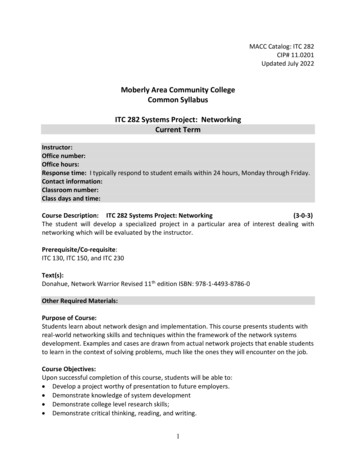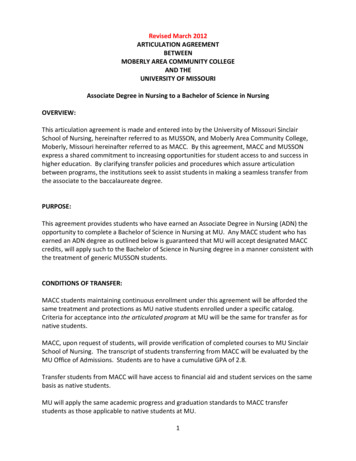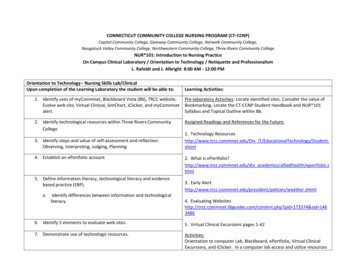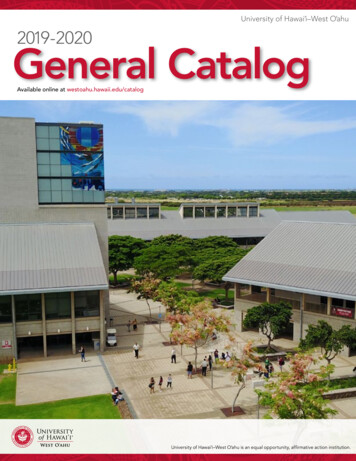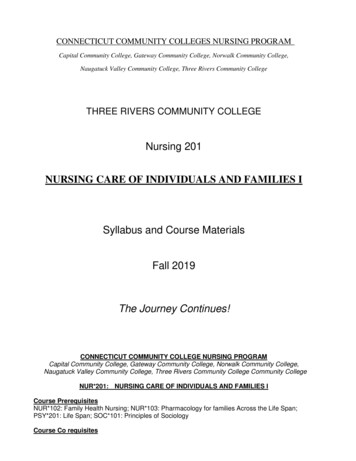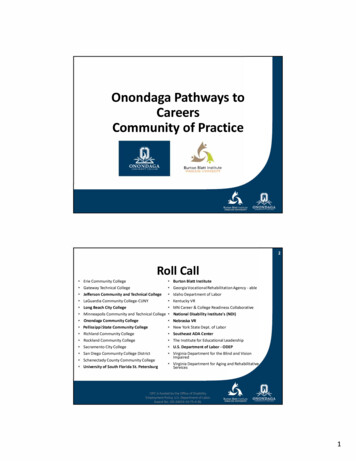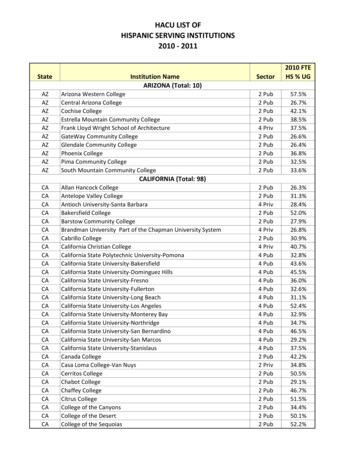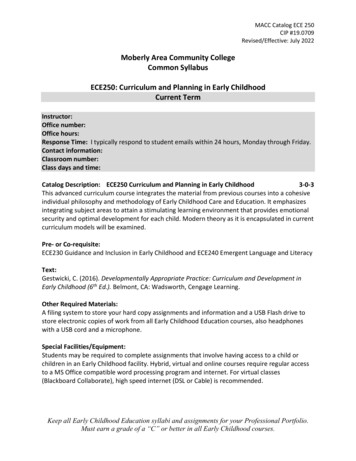
Transcription
MACC Catalog ECE 250CIP #19.0709Revised/Effective: July 2022Moberly Area Community CollegeCommon SyllabusECE250: Curriculum and Planning in Early ChildhoodCurrent TermInstructor:Office number:Office hours:Response Time: I typically respond to student emails within 24 hours, Monday through Friday.Contact information:Classroom number:Class days and time:Catalog Description: ECE250 Curriculum and Planning in Early Childhood3-0-3This advanced curriculum course integrates the material from previous courses into a cohesiveindividual philosophy and methodology of Early Childhood Care and Education. It emphasizesintegrating subject areas to attain a stimulating learning environment that provides emotionalsecurity and optimal development for each child. Modern theory as it is encapsulated in currentcurriculum models will be examined.Pre- or Co-requisite:ECE230 Guidance and Inclusion in Early Childhood and ECE240 Emergent Language and LiteracyText:Gestwicki, C. (2016). Developmentally Appropriate Practice: Curriculum and Development inEarly Childhood (6th Ed.). Belmont, CA: Wadsworth, Cengage Learning.Other Required Materials:A filing system to store your hard copy assignments and information and a USB Flash drive tostore electronic copies of work from all Early Childhood Education courses, also headphoneswith a USB cord and a microphone.Special Facilities/Equipment:Students may be required to complete assignments that involve having access to a child orchildren in an Early Childhood facility. Hybrid, virtual and online courses require regular accessto a MS Office compatible word processing program and internet. For virtual classes(Blackboard Collaborate), high speed internet (DSL or Cable) is recommended.Keep all Early Childhood Education syllabi and assignments for your Professional Portfolio.Must earn a grade of a “C” or better in all Early Childhood courses.
MACC Catalog ECE 250CIP #19.0709Revised/Effective: July 2022Purpose of Course:A young child’s care and education must be holistic. This course addresses all developmentaldomains to integrate learning strategies so the student will be better able to meet the long-termdemand of diverse children’s individual needs within the context of a group setting.Connection with Career and Technical Education (CTE) Outcome Statement:In compliance with MACC’s CTE outcomes, the student who successfully completes this coursewill be able to:Outcome I:Students will demonstrate effective written and oral communication skills. 4.1 Demonstrate effective written and oral communication skills using Standard English.Outcome II:Students will demonstrate an understanding of discipline-related math and scientific principles. 3.1 Understand principles of developmentally appropriate practice, developmentaltheory, inquiry tools and incorporate knowledge of content areas and academicdisciplinesOutcome III:Students will think critically while systematically assessing problems, identifying issues andimplementing solutions. 3.0 Integrate foundational knowledge, appropriate early learning standards and othersources to design, implement and evaluate a meaningful and challenging curriculum topromote positive outcomes for childreno Use research and evidence based approaches, strategies and toolso Apply principles of effective classroom environments in the physical set up andlayout, social and emotional climate and through engaging teacher-studentinteractions 4.7 Identify, allocate and manage human and material resources for ECE porgrams foryoung children and their familiesOutcome IV:Students will apply principles of professionalism and safety standards when entering theworkforce.Outcome V:Students will demonstrate skill mastery and will pursue lifelong learning in their field whileadapting to changing industry standards and following evidence-based practices. 3.3Know and understand assessment and its objectives; use assessment tools andapproaches responsibly and interpret data for developmentally appropriate classroomplanning and instructionKeep all Early Childhood Education syllabi and assignments for your Professional Portfolio.Must earn a grade of a “C” or better in all Early Childhood courses.
MACC Catalog ECE 250CIP #19.0709Revised/Effective: July 2022 3.3 Engage in ongoing professional development, self-reflection and collaboration withother individuals and organizations in ECE for the latest trends and insights into theprofession that lead to informed practice/teachingCourse Objectives: 1.2c Develops and adheres to an educationally sound philosophy (i.e., a coherent set ofbeliefs, concepts and attitudes) of early childhood education, which integrates soundtheory and research with an understanding of personal strengths and values, as a basisfor making professional decisions. 3.4b.Analyze the transition of Developmentally Effective environments from infancy tothe primary years, integrating information on growth, development and learningpatterns of individuals and groups 3.4a Articulate how to create environments and experiences that respect and affirmcultural, linguistic, and developmental diversity. 3.3c.Interpret evidence to evaluate a child's learning and development. 3.3d. Use evidence from classroom-based assessment to guide decisions aboutchildren's learning. 3.1d. Use appropriate communication strategies to support exploration and creativeproblem-solving in process-focused learning. 3.2a.Use a variety of teaching strategies, to support children’s optimal development. 3.2b.Select and use appropriate learning formats (routines, play/centers, large and smallgroups) based on universal, contextual and individual development of the child/childrenand group 3.4a. Balance independent exploration, scaffolding and direct teaching withinintentional planning to enhance physical, cognitive, language, social, and emotionaldevelopment and learning in the content areas. 3.1a.1 List and describe central concepts appropriate to early learning and developmentof language and literacy and resources to deepen understanding of the academicdiscipline 3.1a.2 List and describe central concepts appropriate to early learning and developmentof the arts (music, creative movement, dance, drama, and visual arts) and resources tosupport or deepen understanding of the academic discipline. 3.1a.3 List and describe central concepts appropriate to early learning and developmentof mathematics and resources to support or deepen understanding of the academicdiscipline. 3.1a.4.List and describe central concepts appropriate to early learning and developmentscience and resources to support or deepen understanding of the academic discipline. 3.1a.5. List and describe central concepts appropriate to early learning anddevelopment physical activity, physical education, health and safety and resources tosupport or deepen understanding of the academic discipline.Keep all Early Childhood Education syllabi and assignments for your Professional Portfolio.Must earn a grade of a “C” or better in all Early Childhood courses.
MACC Catalog ECE 250CIP #19.0709Revised/Effective: July 2022 3.1a.6 List and describe central concepts appropriate to early learning and developmentsocial studies and resources to support or deepen understanding of the academicdiscipline.3.2c. Plan developmentally appropriate opportunities for learning central concepts ofthe academic disciplines, selecting effective inquiry tools for the sources of knowledge(conventional, logico-mathematical, or physical)3.1c. Select curriculum compatible with one's personal philosophy of Early Care andEducation and the Missouri Early Learning Standards, based on sound research andtheory3.1b. Address curriculum standards and objectives, including the Missouri Early LearningStandards and Show-Me Standards, through a play-centered curriculum that includesthe major content areas4,3a.Make decisions for future practice based upon self-evaluation of the effectivenessof current actions and communications.4.7a.Apply knowledge of federal, state and local regulations and professional standardsto provide safe, healthy, developmentally appropriate environments for young children.4.1c Incorporate ideas and information from readings and personal reflection into ownwriting4.1b. Produce effective written communication for the purpose and audienceCourse Content: Theories of learning and philosophy of education Curriculum models The learning environment: physical and temporal Planning for individual and group needs Curriculum Standards: content, concepts and skills of early learning Integrating all the parts into a planned curriculumAssessment of Student Learning:90-100%A80-89%B70-79%CIf you receive a grade below a C you will have to retake the course.60-69%DBelow 60%FPlease keep in mind that at the college level it is expected that you will spend 2—3 hours perweek on homework for each credit hour earned for the course. This is a X-credit hour course, soyou should expect to spend X*2—X*3 hours studying each week.Keep all Early Childhood Education syllabi and assignments for your Professional Portfolio.Must earn a grade of a “C” or better in all Early Childhood courses.
MACC Catalog ECE 250CIP #19.0709Revised/Effective: July 2022Description of Major Assignment(s)/Project(s):A project showing your knowledge of appropriate environments forpreschoolers (3-5, mixed age group) or a primary room includingspace, materials and time managementA project showing your knowledge of appropriate environments forinfants (non-mobile & mobile, birth-18 mos.) or toddlers (15 to 28mos.) including space, materials and time managementContent Area Plans—Math, Science, the ArtsFinal Philosophy of Education Varied other assignments as needed to support mastery of thematerialWeekly Discussion ThreadsOnline Idea FileQuizzesFinal Project Points757550 each10015—30 each5 each5 each25 each100General Notes:EC Program Policy: The ability to communicate professionally is very important for the EarlyChildhood Professional. Therefore, 10% of all scores will be based on grammar, punctuationand spelling. The instructor reserves the right to return particularly poorly written assignmentsto be re-written before they are graded. These assignments are common to all sections of this course. They are suggested artifacts forthe student’s Professional Portfolio. However, the student will select work he/she believes bestreflects his/her competence in meeting the Program Outcomes.The instructor may make changes in this syllabus including course content, schedule ofactivities, assignments, and point distribution to better meet the needs of the students at anytime during the semester.INSTRUCTOR POLICIES:Attendance:Any student who misses two consecutive weeks of class during a regular sixteen week semesteror the equivalent proportion of the class time during a shorter session will be dropped from theclass by the instructor unless acceptable justification is supplied. Additionally, any student whomisses more than one-fourth of the entire number of in-seat class meetings in a regular 16- weeksemester or the equivalent proportion of class time during a shorter session, may be droppedfrom that class by that instructor if, in the opinion of the instructor, the student does not havereasonable opportunity to succeed in the class. A student’s attendance rate will be calculatedbased upon first day of semester (not the student’s date of enrollment in the course).Keep all Early Childhood Education syllabi and assignments for your Professional Portfolio.Must earn a grade of a “C” or better in all Early Childhood courses.
MACC Catalog ECE 250CIP #19.0709Revised/Effective: July 2022For online, hybrid, and virtual courses: Student attendance in these courses is defined as activeparticipation in the course. Online, hybrid, and virtual courses will, at a minimum, have weeklymechanisms for student participation, such as any or all of the following methods:a. Completion of quizzes or examsb. Submission of assignmentsc. Participation in threaded discussionsd. Communication with the instructorA student who does not participate in an online, hybrid, or virtual course for two consecutiveweeks will be dropped by the instructor unless acceptable justification is supplied. As withground courses, a student’s attendance rate in online courses will also be calculated basedupon the first day of the semester. If a student does not demonstrate active participation inthe online course within the first two weeks (or the equivalent proportion of class time during ashort session), the student will be dropped as “never attended”. Simply logging into an onlineclass does not constitute active participation.For Virtual/Blackboard Collaborate Attendance:In a virtual class participation includes being able to hear and respond orally during BlackboardCollaborate sessions. A working headset is mandatory to meet this requirement.If there is a technology glitch that disconnects freezes or otherwise interferes with theinstructor’s transmission, you are expected to wait ten (10) minutes before leaving BlackboardCollaborate. If the instructor is not able to reconnect, or communicate with you throughBlackboard Collaborate, after 10 minutes, she will post an announcement in Tristate withfurther instructions as soon as possible.Note: Although it is the student’s right to make judgments about the legitimacy of his/herabsence from class, the instructor must follow college policy. It is important to notify yourinstructor in writing or by email in advance of planned absences and as soon as possible in theevent of emergency absences, Assignments do count as part of your attendance and should beturned in even when absent. However, the instructor makes every effort to make class timevaluable to student success, so absences (including tardiness or leaving early) do affect thestudent’s ability to be successful in the course and may lead to dismissal or failure. Therefore, itis recommended that you make arrangements with another student to get notes, handouts andassignments. DO NOT contact instructor for this information.Students should be aware that dropping a course and their last date of attendance in thecourse may impact their financial aid.Tardiness:Prompt attendance is expected at all class meetings, both at the beginning and returning frombreaks. You should be logged into Blackboard Collaborate and have your “Audio Check”completed by 7:25 p.m. Tardiness, extended breaks and leaving class early are consideredpartial absences and will impact your success accordingly.Keep all Early Childhood Education syllabi and assignments for your Professional Portfolio.Must earn a grade of a “C” or better in all Early Childhood courses.
MACC Catalog ECE 250CIP #19.0709Revised/Effective: July 2022Make-up and late work:All assignments should be submitted by [time] of the date due. You may have a one weekextension on three assignments during the semester. You must contact the instructor by emailwithin 24 hours of the due date and time. If contact is not made within 24 hours, a 25%deduction from the final grade will be assessed for the 24 hours after the original deadline.There will be an additional 25% deduction for each additional 24 hours the assignment is late.That means the best grade you can get on this late work is a “C” and after four days it is a “0”.Since you have three free passes, there will be no further appeals accepted for late work.Extra-credit work:Per instructor policy. Must show improved mastery of the specific content of the course. Itshould only be granted to students who have submitted all regular work on time.There may be occasional opportunities to earn additional points in this class by completingsupplementary assignments to improve mastery of material you found difficult. To be eligiblefor this extra credit, all regular assignments must have been submitted on time.In keeping with the program emphasis on writing skills, you may also earn an extra credit pointby correcting a written error in handouts or tests produced by the instructor. Submit yourcorrection in writing.Using other Sources:Educators commonly borrow ideas and activities from books, other teachers, co-workers,students, the Internet, magazines, workshops, etc. While it is permissible to use theseresources, it is important that you tell us where you found the idea. Failure to do so isplagiarism. At a minimum, you need to cite the name of the author and title of the source orthe person’s name.Internet Requirements:As in the nature of an Online or Hybrid course, the bulk of the work required for studentassessment must be submitted through Canvas. This requires regular access to a wordprocessing program and internet.Basic Computer Specifications for Canvas: rted Browsers for Canvas: https://community.canvaslms.com/docs/DOC-1284If you have difficulties logging onto Canvas contact MACC’s Help Desk at 660-263-4100 ext.11555 during the regular business day.For general questions and assistance any of our online resources, contact MACC’s InstructionalTechnology Team at 660-263-4100 ext. 11525 or by email at int@macc.edu.If you have technical difficulties with Canvas, contact Canvas Support. You can access 24/7online resources and support within Canvas. After you log in, click the Help icon in the bottomKeep all Early Childhood Education syllabi and assignments for your Professional Portfolio.Must earn a grade of a “C” or better in all Early Childhood courses.
MACC Catalog ECE 250CIP #19.0709Revised/Effective: July 2022left corner of your screen. The menu that pops up provides quick access to Canvas 24/7 emailand chat support as well as Canvas Guides.If you are having difficulties with Blackboard Collaborate contact Black board CollaborateTechnical Support. Go to Behind the b publichome?dfprod Collaborate) for online/chatsupport, or call them toll free at 1 (877) 382-2293.Additional helpful information about navigating the online environment is available in the lastunit of your course, “Helpful Information”.These resources, plus others, are also provided in the student handbook (Redbook) on ourwebsite at (http://www.macc.edu/studenthandbooks). You can also embed help links directlyin the course. If you would like assistance with this let us know.Schedule of Student Assignment and Activities:Instructors will identify a Student Assignment/Activities schedule. Instructors have theprerogative to construct the schedule by class periods, weeks, or an overview of topics to becovered.COLLEGE POLICIESAttendance:Students are expected to attend all class sessions for which they are enrolled. The Collegereserves the right to drop or withdraw students from courses due to lack of attendance.Students need to be aware that dropping/being dropped from a course and their last date ofattendance in the course may impact their financial aid.MACC faculty are required to track attendance and report lack of attendance. An instructor mustcomplete the appropriate steps to drop a student within one week following the student’sviolation of the attendance policy. Additionally, a student’s attendance rate will be calculatedbased upon the first day the academic session begins (not the student’s date of enrollment in thecourse). If a student does not attend a course as defined below, the student will be dropped as“Never Attended.”Term Length Drop Calculations16-week:Any student who misses two (2) consecutive weeks of class will be dropped fromthe course by the instructor unless acceptable justification is provided by thestudent and the student still has the opportunity to be successful in the course.Keep all Early Childhood Education syllabi and assignments for your Professional Portfolio.Must earn a grade of a “C” or better in all Early Childhood courses.
MACC Catalog ECE 250CIP #19.0709Revised/Effective: July 20228-week:Any student who misses one (1) consecutive week of class will be dropped fromthe course by the instructor unless acceptable justification is provided by thestudent and the student still has the opportunity to be successful in the course.4-week:Any student who misses two (2) consecutive days of class will be dropped from thecourse by the instructor unless acceptable justification is provided by the studentand the student still has the opportunity to be successful in the course.Intersession: Any student who misses one (1) day of class will be dropped from the course bythe instructor unless acceptable justification is provided by the student and thestudent still has the opportunity to be successful in the course.Acceptable justification may include, but is not limited to, family emergencies, illness or injury,college-approved co-curricular and extra-curricular activities, and religious holidays.Definition of Course AttendanceIn SeatPhysically attending scheduled, face-to-face,Courseclass meetingsVirtual CourseHybrid CourseOnlineCourseBeing present, via appropriate platform, forscheduled class meetings/activitiesPhysically attending scheduled, face-to-face,class meetings and active participation in theonline portion of the course which mayinclude any or all of the following: Completion of quizzes or examsduring class meetings and online Submission of assignments duringclass meetings and online Participation in discussions duringclass meetings and onlineActive participation in an online courseincludes the following: Completion of quizzes or exams Submission of assignments Participation in threaded discussionsSimply logging into the Learning Management System (Canvas) and/or accessing the course andcourse related material does not constitute active participation for the online component ofhybrid courses or for online courses. (Policy Handbook, G.040)Academic Dishonesty:MACC board policy is as follows: “Academic dishonesty by students damages institutionalcredibility and unfairly jeopardizes honest students; therefore, it will not be tolerated in anyform.” Forms of academic dishonesty include but are not limited to the following: violations ofKeep all Early Childhood Education syllabi and assignments for your Professional Portfolio.Must earn a grade of a “C” or better in all Early Childhood courses.
MACC Catalog ECE 250CIP #19.0709Revised/Effective: July 2022copyright law, plagiarism, fabrication, cheating, collusion, and other academic misconduct.Incidents of dishonesty regarding assignments, examinations, classroom/laboratory activities,and/or the submission of misleading or false information to the College will be treated seriously.The procedure for handling academic dishonesty is outlined in the Student Handbook (PolicyHandbook G.020). In cases of alleged academic dishonesty, the burden of proof is on the student,not on the instructor.Student Email:MACC Mail is the official student email system at MACC. Official college communication is sentvia this email system. Students are responsible for checking their MACC Mail account regularly.Students may also receive notifications and reminders from MACC through the online learningplatform. However, students should remain aware that the online learning platform messagingsystem and MACC Mail (student email) system are two separate systems.Recording Class Sessions Using Zoom:The privacy of students is a priority in live or virtual meetings. Recordings of lectures or classmeetings that share student information constitute an educational record and are protectedunder FERPA. Instructors may share recordings within the course section where they wereoriginally recorded and only with the students enrolled in the section. Documented consentfrom each student identified in the recording is required to distribute outside of the coursewhere it was originally recorded, or student identity must be redacted.ADA Statement:Students who have disabilities that qualify under the Americans with Disabilities Act may registerfor assistance through the Office of Access and ADA Services. Students are invited to contact theAccess Office to confidentially discuss disability information, academic accommodations,appropriate documentation and procedures. For more information, please call either theMoberly office at (660) 263-4100 Ext. 11240 or the Columbia office at (573) 234-1067 Ext. 12120,or visit our web page at ce.Title IX Statement:MACC maintains a strict policy prohibiting sexual misconduct in any form, including sexualharassment, sexual discrimination, and sexual violence. All MACC employees, including facultymembers, are considered mandated reporters of sexual misconduct and as such are expected tocontact the Title IX Coordinator when they become aware, in conversation or in writing, of anincident of sexual misconduct. For more information on this policy or to learn about supportresources, please see http://www.macc.edu/sexual-misconduct-policy or contact Ms. CherylLybarger, MACC's Title IX Coordinator, at 660-263-4110, ext. 11369 orCherylLybarger@macc.edu.Keep all Early Childhood Education syllabi and assignments for your Professional Portfolio.Must earn a grade of a “C” or better in all Early Childhood courses.
3.1c. Select curriculum compatible with one's personal philosophy of Early Care and Education and the Missouri Early Learning Standards, based on sound research and theory 3.1b. Address curriculum standards and objectives, including the Missouri Early Learning Standards and Show-Me Standards, through a play-centered curriculum that includes
